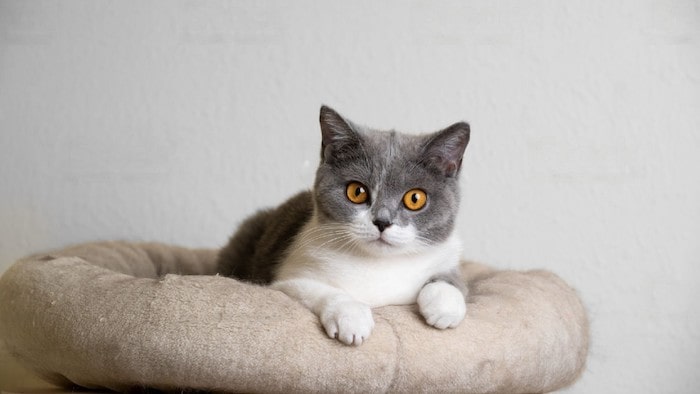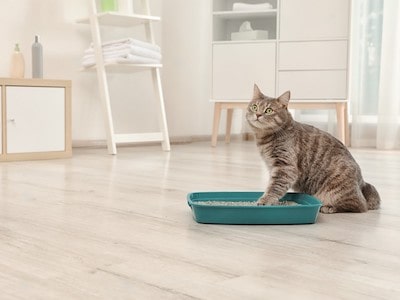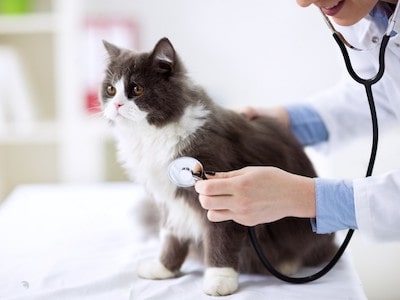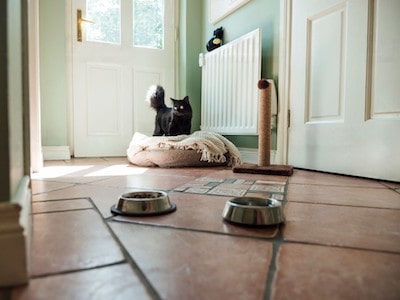As a pet parent, we all know how frustrating it is to discover that our furry friend has peed on the dog bed. It’s like finding a needle in a haystack, except in this case, it’s a wet and smelly one.

But why would your cat do such a thing? Does he have something against your pup? Is it a territorial dispute or a cry for help? Fear not, dear reader, for we have answers!
In this article, we’ll explore the top reasons why cats pee on the dog bed and provide you with practical tips on how to address this unpleasant behavior. So sit back, grab a cup of tea, and let’s get to the bottom of this mystery together!
Reasons Why Cats Pee on the Dog Bed
Many cat owners find themselves perplexed and frustrated when their cats engage in the habit of peeing on the dog bed. As Per animalpath “When your cat pees on your dog’s bed, it usually means that it is marking its territory or there is an ongoing rivalry between your pets.” While cats are known for being fastidious creatures, it can be difficult to understand why they choose to do this.
Despite its prevalence, the reasons behind this behavior remain unclear. Here are seven possible reasons why cats might pee on the dog bed:
- Territory marking: Cats are notorious for marking their territory, and they may view the dog’s bed as a prime spot to claim as their own.
- Litter box issues: If your cat is unhappy with their litter box for any reason – such as it being too dirty or not the right type of litter – they may seek out other places to relieve themselves, like the dog’s bed.

- Stress or anxiety: Cats are sensitive creatures, and they may pee on the dog bed as a way of expressing their stress or anxiety.

- Medical issues: Urinary tract infections, kidney problems, and other medical issues can cause a cat to urinate in unusual places.

- Aversion to the litter box: Some cats just don’t like using the litter box, whether it’s because they don’t like the litter, the box itself, or its location.
- Aging: Older cats may have difficulty accessing the litter box due to mobility issues, leading them to seek out other spots in the house to go.
- Social dynamics: If your cat doesn’t get along with your dog, they may mark their territory on the dog’s bed as a way of asserting dominance.
How to Stop Cat From Peeing on Dog Bed
If your cat is peeing on the dog bed, it can be frustrating, but it’s important to address the issue as soon as possible to prevent it from becoming a habit. According to animalpath “cats are repeat offenders when it comes to peeing, removing the smell of their pee from the dog bed will help make it a neutral zone.” Here are some tips for stopping your cat from peeing on the dog bed:

- Rule out any underlying medical issues: Before you try any behavior modification techniques, take your cat to the vet to make sure there are no underlying health issues that are causing the behavior.
- Provide multiple litter boxes: If your cat is peeing on the dog bed because they don’t like their litter box, try providing multiple boxes in different locations with different types of litter to see if your cat has a preference.
- Clean the dog bed thoroughly: Make sure you clean the dog bed thoroughly with an enzymatic cleaner to remove any urine scent. This will discourage your cat from returning to the same spot.
- Limit your cat’s access to the dog bed: If your cat is repeatedly peeing on the dog bed, consider limiting their access to that area of the house.
- Use deterrents: You can try using deterrents such as double-sided tape, aluminum foil, or citrus sprays on the dog bed to discourage your cat from going near it.
- Seek professional help: If your cat continues to pee on the dog bed despite your best efforts, consider consulting with a veterinarian or animal behaviorist for more specialized help.
FAQs
Is it normal for cats to pee on dog beds?
No, it’s not normal behavior. While there can be various reasons for cats to pee outside the litter box, it’s important to address the issue as soon as possible to prevent it from becoming a habit.
How can I clean a dog bed that my cat has peed on?
Use an enzymatic cleaner specifically designed to eliminate pet urine odor and stains. Follow the instructions carefully, and consider using a washing machine if possible. Avoid using harsh chemicals or bleach as they can be harmful to your pet.
Can stress or anxiety cause cats to pee on the dog bed?
Yes, stress or anxiety can be a contributing factor to inappropriate elimination in cats. Make sure your cat has plenty of opportunities for play and exercise, and consider creating a safe and comfortable space for them to retreat to.
Can a cat’s diet cause them to pee on the dog bed?
Yes, certain dietary factors, such as too much protein or too little water intake, can contribute to urinary issues and inappropriate elimination in cats. Consult with your veterinarian about your cat’s diet to make sure it’s appropriate for their needs.
Can spaying or neutering my cat prevent them from peeing on the dog bed?
Spaying or neutering your cat can help reduce their urge to mark their territory, but it’s not a guarantee that they won’t pee on the dog bed. Other factors such as stress or medical issues can also contribute to inappropriate elimination.
Also, if you’re a dog lover, you won’t want to miss the valuable resources and recommendations available at DogLovesBest.
Well, That’s a Wrap
Dealing with a cat that is peeing on the dog bed can be frustrating and challenging, but it’s important to address the issue as soon as possible.
By ruling out any underlying medical issues, providing multiple litter boxes, cleaning the dog bed thoroughly, limiting your cat’s access to the bed, using deterrents, and seeking professional help if necessary, you can help modify your cat’s behavior and prevent them from peeing on the dog bed in the future.
Remember, patience and consistency are key when trying to modify your cat’s behavior, and with time and effort, you can create a happy and healthy home for both your cat and your dog.

Charlene Pare is the founder of Cat Likes Best. She manages and strategizes the content published on this website. When she isn’t working, she enjoys exploring the city around with her Ameican Shorthair kitty–Moli. Being a technocrat and an avid cat lover, she also writes on pet tech products and some of the featured articles.




